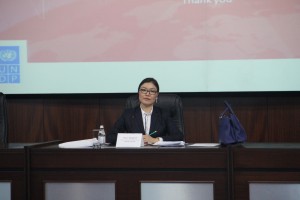Deputy Resident Representative of the United Nations Development Programme Munkhtuya Altangerel presented findings from Human Development Report 2014 “Sustaining Human Progress: Reducing Vulnerabilities and Building Resilience” at Nazarbayev University on Jan. 30.
The event targeted at a student audience provided the technical findings of the report in layman’s terms.
According to the 2014 Report human development progress is slowing down. It suggests that globalization has created new risks despite being beneficial to many throughout the world. Because of international interconnectedness financial and food crises now affect many more nation and this year the number of people displaced by violence has seen the highest ever, totaling 45 million.
“This shows that in our increasingly connected world we face new vulnerabilities. Traditionally, most analysis of vulnerability is in relation to specific risks such as disasters or conflicts. In this report, we take a wider approach, to understand the underlying drivers of vulnerabilities, and how individuals and society can become more resilient and recover better and quicker from setbacks,” says Altangerel. “Thus, the report focuses on those who are particularly vulnerable such as the poor and other disadvantaged groups and asks why some people or communities are more resilient than others, even when they face the same risks?”
But Kazakhstan’s human development is improving according to the Report. The latest version of the HDR places the country at number 70 out of 187 nations compared in the analysis.
The report talks about life-cycle and structural vulnerabilities, showing how capabilities are formed over a person’s lifetime and threats that people face in different stages of life, from infancy to youth, adulthood and to old age. Altangerel pointed out “the report looks into the most sensitive phases where humans are particularly vulnerable and how these vulnerabilities can be addressed to ensure growth.” Among those are discriminative practices, risks of natural disasters or risks of not having equal opportunities because of being different, because of one’s gender, nationality, race, or disability.
The report further states that the phenomenon of so-called “youth bulge,” when a large share of the population is comprised of children and young adults, puts additional strain on economies that are unable to meet this rising demand for jobs and social security measures.
“Human Development Report stresses that resilience is a key ingredient of development. Both Kazakhstan’s Nurly Zhol policy and Sustainable Development Goals centre on the well-being of people, putting social and economic interests at the forefront. In this respect, these two important documents coincide and complement each other to make people’s livelihoods richer” says Altangerel.
“I found the presentation really informative and interesting. A lot of people are not familiar with the terminology used in the Human Development Report but when you attend such presentations it becomes clear. I have taken a copy of the Report in English and Russian to save for my future work, I think it might prove useful,” says Inkara Miryakupova, a public relations officer who attended the event.
The main goal of Kazakhstan’s Strategy 2050 presented by President Nursultan Nazarbayev in 2012 is to become among the top 30 most developed countries of the world. The national action plan for achieving this aim puts in place New Principles of Social Policy to guarantee basic social standards to people and prevent poverty growth. The latest findings contained in the HDR signal that Kazakhstan is on track to meet its target.
The UNDP’s flagship report was first published in 1990 and has become a milestone publication measuring human development across the globe. This year’s report focuses on how nations help their people gain access to basic social services such as healthcare, education and employment, as well as build capacities and capabilities. The report also looks into vulnerabilities preventing people from enjoying equal rights and development gains.


